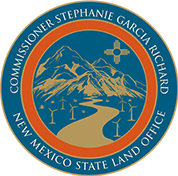FOR IMMEDIATE RELEASE
December 15, 2020
Contact:
Angie Poss, Assistant Commissioner of Communications
505.470.2965
aposs@slo.state.nm.us
State Land Office Halting Commercial Sale of Fresh Water for Oil and Gas
SANTA FE, NM – In a letter issued today Commissioner of Public Lands Stephanie Garcia Richard announced plans to halt the practice of commercial sale of fresh water from state trust lands for oil and gas development. This shift in policy will better ensure the long-term stewardship of state trust lands and natural resources.
The Commissioner sent the letter to companies that hold easements that grant access to state trust land to pump fresh water for sale to the oil and gas industry. The letter articulates, “No new easements will be issued for the sale of water for use in oil and gas, and existing easements will be not be renewed once they expire.”
Fresh water is an ever-scarcer resource, and the newly adopted State Land Office policy seeks to encourage the industry to use recycled or produced water instead of fresh water, which can impact already scarce local and municipal fresh water supplies (New Mexico town, oil companies in fight over water use). The new policy does not affect the issuance of fresh water easements for other purposes, such as agricultural or municipal use.
Drilling and completing an oil and gas well, including the process of hydraulic fracturing or “fracking,” can mostly be accomplished without fresh water. A relatively small amount of fresh water is required for drilling to avoid contamination of geologic formations where other fresh water exists. Fracking consumes millions of gallons more water than drilling and does not require fresh water. Any fresh water used for drilling or fracking is permanently disposed of unless it’s recycled within the industry. If existing technologies were used to prioritize recycling, that water would be available for reuse within the oil and gas industry and could drastically reduce the amount of fresh water used in the process.
To visualize the impact of continuing to allow the use of fresh water for fracking, an August 2019 Houston Chronicle article noted, “In the arid Permian Basin, the nation’s most productive oil field, drilling and fracking operations consume more than 195 million gallons of water per day in West Texas and southeastern New Mexico — enough water to fill nearly 300 Olympic-sized swimming pools.”
Water use data reported by companies to FracFocus indicates that nearly 14.5 billion gallons of water were used for overall production in New Mexico in 2019, with recycled or produced water comprising only a fraction of the total water use. That is equivalent to the amount of water needed for an entire year of domestic and household use for over 278,000 people, or roughly one-eighth of New Mexicans.
Oil production on state trust land in the Permian Basin is at an all-time high despite disruptions beginning in February 2020 brought on by the Covid-19 pandemic and a global price war. A byproduct of that increased oil production is an increase in availability of produced water. A study by Global Water Intelligence estimates that every gallon of oil produced in the Permian Basin yields 4-10 barrels of produced water.
Commissioner of Public Lands Stephanie Garcia Richard released the following statement regarding the policy change:
“This shift in policy represents the State Land Office doing our small part to help protect and preserve New Mexico’s scarce and sacred fresh water resources. Water is life, and wider intervention is needed from the State Legislature to address New Mexico’s water issues in critical areas. Rather than looking at fresh water as a commodity for sale to the highest bidder, we should look at the advancements in water recycling and produced water as our way forward. There is simply no reason for fresh water to be used for fracking. Fresh water is necessary to grow food. It is not necessary for oil and gas production, except when drilling through fresh water areas.
“The importance of conserving scarce fresh water so that it is available for the uses that require it, while discouraging the use of fresh water for purposes that do not require it, is the message we are trying to send in this policy. It is important to also emphasize the outsize impact that fresh water use for oil and gas can have on our small communities, like those in proximity to the Permian Basin, who are fighting industry for access to fresh water.
“After the wells run dry, which is an increasing threat as we battle climate change, there is no economical process in which we can manufacture fresh water or water that is safe to drink or use to grow our food. If we are reliant on an economy based on getting oil out of the ground, we should be prioritizing the use of recycled or produced water to do so. Our future generations are counting on us to smart make decisions that will profoundly affect their quality of life.”
Under the leadership of Commissioner of Public Lands Stephanie Garcia Richard, the New Mexico State Land Office has seen back-to-back years of revenue over $1 billion. Over 13 million acres of state trust land are leased for a variety of uses, including ranching and farming, renewable energy, business development, mineral development, and outdoor recreation. The money earned from leasing activity supports 22 beneficiaries – New Mexico public schools, seven universities and colleges, the School for the Deaf, the School for the Blind and Visually Impaired, three hospitals, water and land conservation projects, and public building construction and repair.
